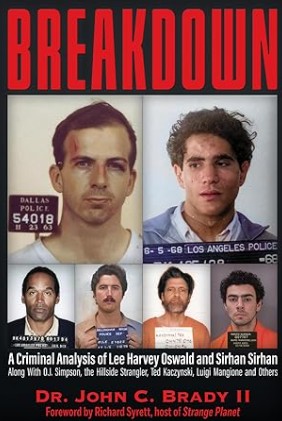Killer Parallels: Kirk Assassin and Luigi Mangione Share Near Mirror-Image Murder Motives
Forensic psychologist Dr. John Brady has spent decades analyzing the minds of violent offenders, but few cases have struck him with the same resonance as those of Luigi Mangione—the alleged killer of UnitedHealthcare CEO Brian Thompson—and Tyler Robinson, the accused assassin of Charlie Kirk. While the public sees two different crimes separated by circumstance, Brady sees a chilling alignment in behavioral patterns that demands urgent attention.
Dr. John Brady, a nationally recognized forensic psychologist, is extremely familiar with the bizarre mental makeup of such killers. The psychological DNA of these killers fascinates people, and no one breaks it down like Brady.
Psychological DNA: A Cold Case Analysis of Who Killed Robert F. Kennedy
Pre-Order Brady’s new Book Breakdown: A Criminal Analysis of Lee Harvey Oswald and Sirhan Siran
Brady is not just another voice in criminal psychology. What separates him is his mastery of behavioral pattern recognition, an expertise that allows him to connect disparate cases with precision. It’s more than what normal forensic psychologists to. In his ongoing study of Robinson, Brady found startling overlaps with Mangione—overlaps that underscore how certain psychological traits, if identified early, could modify destructive behaviors and prevent catastrophic violence.
Here are the commonalities Brady highlights:
- Alienation from mainstream society: Both men experienced deep estrangement and resentment toward institutions they perceived as corrupt—corporate health care in Mangione’s case, political conservatism in Robinson’s.
- Symbolic targeting: Neither chose their victims randomly; each selected high-profile figures they viewed as embodiments of the systems they despised.
- Meticulous preparation: Both devoted significant time to planning, whether it was Mangione’s stalking of Thompson or Robinson’s rooftop setup with a sniper’s rifle.
- Narcissistic framing of motives: Each believed their actions would resonate beyond the immediate crime, casting themselves as catalysts for a larger statement.
- Digital footprints: Both left trails of online communications—Mangione through writings and social media, Robinson through texts and confessions—that revealed ideological obsessions and self-justification.
- Cult of image: Fascination with Mangione’s appearance and Robinson’s carefully curated online identity underscores how both were invested in being “seen” as more than anonymous actors.
Brady refers to men like Mangione and Robinson as “ideological tourists.” They are not lifelong revolutionaries or hardened radicals, but rather individuals who drift into extremist frameworks, sampling just enough ideology to validate personal grievances before weaponizing them. This construct, Brady argues, is a powerful diagnostic category—one that could inform law enforcement, educators, and policymakers in building interventions before grievances metastasize into violence.
Dr. John Brady’s work is not about sensationalism—it’s about prevention. By dissecting the shared DNA of killers like Mangione and Robinson, he provides the kind of actionable insight that separates forensic psychology from mere post-mortem analysis. He doesn’t just explain these tragedies—he shows how we can stop the next one.
Relevant Article(s):
Pre-Order Dr. Brady’s New Book
OPTIONAL Q&A
- What does Dr. Brady mean when he calls Mangione and Robinson “ideological tourists”?
- How does this concept differ from traditional definitions of radicalization or extremism?
- What early warning signs in behavior or communication did both men exhibit?
- Why is the element of “symbolic targeting” so important in understanding their actions?
- How can institutions—schools, workplaces, law enforcement—use Brady’s framework to identify potential threats?
- What role did digital footprints play in revealing their psychological states?
- Why is Brady’s method of behavioral pattern recognition more effective than standard profiling?
- How can studying these cases help prevent future acts of ideologically motivated violence?
ABOUT DR. JOHN BRADY…
Dr. John Brady is a forensic psychologist who for 25 years has spent hours analyzing why individuals commit heinous crimes, providing testimony in numerous criminal cases, and writing six books taken directly from his professional clinical work and court records.
Having worked with some of the nation’s top defense attorneys, prosecutors, private investigators, judges and even perpetrators themselves, Dr. Brady holds that powerbrokers in some of the most prosperous communities often work to hide the evil lurking within some of the biggest work hubs, endangering the public by withholding information.
Dr. Brady, who has written about why wealthy women shoplift to why individuals commit horrific mass-murders, can explain the step-by-step journey taken in the perpetrators’ unconscious journey into darkness.
“It is possible to learn to identify the hidden reasons for crime,” said Dr. Brady, “to understand what leads an individual to the breaking point.”
Whether such behaviors can be attributed to depression, to over-medication with anti-psychotic drugs, or to disorders such as dissociative identity disorder, Dr. Brady can discuss why the criminal is often caught in their own trap.
Books by Dr. Brady include:
PSYCHOLOGICAL DNA: A Cold Case Analysis of Who Killed Robert F. Kennedy
Men of steal: A brief look at the psychology of Celebrity Theft
Why Rich Women Shoplift
Klepto-Bismo: Big Pharma, Shoplifting and Psychiatric Deception
Caught in a Trap
Treat Me: Help for Behavioral Addictions
To schedule an interview contact Bookings@Specialguests.com or call 512-966-0983


